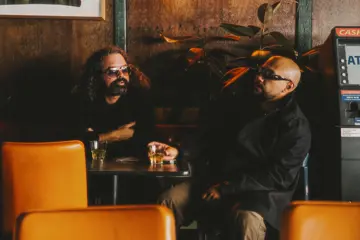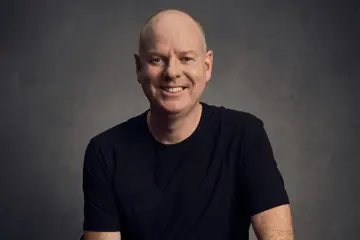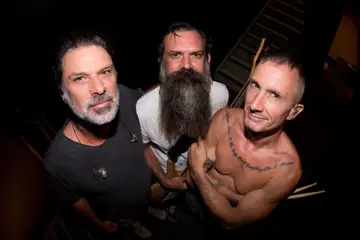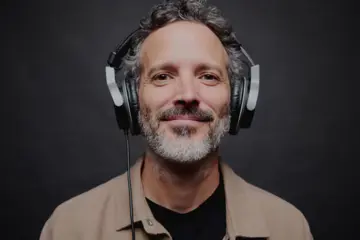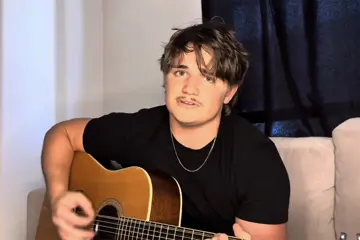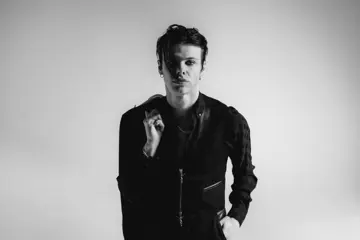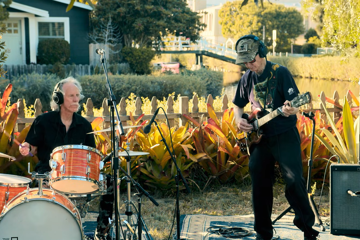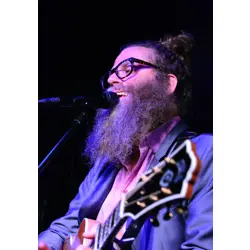 Ben Caplan
Ben CaplanFresh out of Halifax, Canada, alternately wielding guitar, banjo, piano and melodica, singer-songwriter Ben Caplan – though looking like a more rugged refugee from the ZZ Top school of rock musicians – sounds like a cross between Tom Waits and Seasick Steve, while being at least 30 years their junior, all of which has conspired to see him dubbed 'Buzz Band of the 2012 East Coast Music Awards' by Canada's CBC Music. As it happens, he's been strutting his stuff on stages around his home country since at least 2006 – releasing an eponymous EP with his band, The Casual Smokers, in 2009, before the solo album, 2011's In The Time Of The Great Remembering – and not just as a musician. There's a thespian, or at least an early passion for musical theatre, and a philosopher, the field of study he undertook at university, in there too.
“You know,” Caplan admits, “I think I was writing music a lot earlier than I was writing songs. My first musical endeavour was a band that I formed round about the age of 16 or 17, a little folk duo, and most of the songs were written by me receiving poems that my bandmate had written and writing music to them. So almost all the songs, he supplied the lyrics and I supplied music and we worked out arrangements together.
“And it was only I guess around the time I was 18, 19 years old, that collaboration ceased for geographical reasons – I'd written a couple of songs before that – but I only really started to get my hands into it once I'd sort of got this addiction for writing songs, writing music for songs, that suddenly I didn't have somebody supplying a verse or lyrics or, you know, written ideas, I had to start writing a few myself. Writing the music to this day comes quicker, faster and easier for me and it's figuring out what to write about once I've had an idea and finding the way in and finding a new way of saying old things, or old ways of saying new things perhaps – that's the tricky part.
“The stories are coming from lots of different places. Some of the songs are personal and they are drawn from my own life, and then others are drawn from more mysterious places. You know, I mean, for example, my song Stranger was written not with any intentionality, like I'm gonna write a song and this is gonna be what it's about – that song, it came from a more mysterious place and I actually didn't really know what the song was about until I finished writing it.
Don't miss a beat with our FREE daily newsletter
“There's art and there's craft. The craft of songwriting is figuring out how to know when a song is done and how to edit a song and what sort of tricks to use to make it more accessible to an audience. And I think on the other side of songwriting is this more mysterious part. There's this aspect of inspiration and mystery, and so, you know, on that end of things, where does it come from? I'm not really sure. I believe that a lot of them come from sort of just outside of reach, somewhere out there in the ether, and I think it's the role of the songwriter to be a bit of a conduit. I think it's best if inspiration finds you working but I think the best songs just show up.”
While Caplan played in a rock band in high school, and he listens to lots of different kinds of music – “more than just folk music,” he suggests – “acoustic music really turns me on in a way that electronic music has a harder time doing. I won't say that there aren't rock'n'roll songs or other electronic music that get me excited, but when I hear an acoustic instrument being played well, there's just something about that – I connect with that much deeper.”
Once Caplan released In The Time Of The Great Remembering, his career really started taking off at a rate of knots, moving from playing clubs to festivals and getting nominated for several Nova Scotia Music Awards.
“When I was in university studying and starting to just focus more and more seriously on writing songs, I lived with a guy who was a poet and he was in his late 40s, and things were just on the cusp of starting to take off for him, I remember having some long conversations with him about the arts and having a life, you know, tryin' to write and be a writer and living in that sort of way, what he said basically was that he had been told early in his career that you should do it for ten years and if anything happens much quicker than ten years, you'll be one of the lucky ones.
“So I mean I was kind of ready, I sort of expected, okay, I'll do this album I'll get out on the road and we'll get this whole sort of thing going and maybe eight to ten years from now I can have a career, I can quit my job and do this full-time. And now it's all I do, two years on from writing this kind of record and I have a hard time keepin' up with my touring schedule. So I was not anticipating things to move at this kind of colossal speed. I'm not a wealthy man yet by any stretch of the imagination, but I get to do what I wanna do all day every day. So things have progressed pretty quickly,” he chuckles.
“All the travelling has given me a lot to think about and given me a lot of time to think as well. I do a little bit of research about the geography and the history of each place I go visit, just so I can, like, keep my eyes peeled.”
As often seems to be the case, Europe has embraced the music of Ben Caplan in a way that far outstrips his profile in his homeland, playing to audiences there three and four times the size of those in Canada, and of course his appearances at Bluesfest, as part of his first tour of Australia, will see him performing to similarly large audiences, and on the strength of just that one album so far.
Caplan has been a resident of and feels his loyalties are very much owed to Halifax, on Canada's east coast, where he has become something of a cultural fixture, but he was born and raised in Hamilton, Ontario. Either way, he sees himself as very much a Canadian artist.
“Absolutely, and I think that there's a certain Canadian – what's the word? I'm blanking – quality to what I do, and it might not sound a stereotypically Canadian kind of music, but I think that the way disparate elements are fused together is kind of a Canadian thing. We're not afraid in Canada to do the unexpected thing or to mix genres, and a lot of times Europeans will ask, 'How did you come up with this crazy idea for mixing folk with blues with klezmer with all this different other stuff?' And the answer, and I think it's a bit of a Canadian answer, is that I didn't think of it, it sort of happened and it didn't seem weird or unacceptable to mash these things together – it just came out that way.”
The philosopher in Caplan may have been put aside for now, but it still addresses his songwriting in a way, not least in the idea behind the album's title, a comment on the fact that he feels we're moving out of what he's described elsewhere as a “one-size-fits-all civilisation” into a period where we define ourselves more by our sense of place, or where we belong in the world.
“It's very important to me; I mean ideas and words are at the heart of it, and I think that too many bands are just sort of pissin' around and throwin' words around and I think, you know, maybe if you want to get pissed up and dance to it, that's fine, but if you wanna have a song that's gonna last for more than a couple of years, I think it's important that there are some strong ideas behind it and that you're actually trying to say something. So the difficult part for me is figuring out what the hell I want to say.”
BEARDY ROCK
It seems every band worth its hipster credibility sports at least one member with a face that's not afraid to allow an excess of follicular forestation to take centre stage. Of course, at least one Australian band has opted to make the growing of beards their international crusade, though just how long The Beards can ride the zeitgeist pushing songs strictly about beards is a moot point. Even that other recent Australian export, the Spooky Men's Chorale, who proudly sing, “We can grow beards… If we want to”, have moved onto other topics.
For Ben Caplan, the decision to join the bearded fraternity may have been a simple desire not to have to shave every bloody day, because he's certainly not made it the cause celebre within his musical oeuvre, despite the constant references to his abundant foliage. Get over it, you can almost hear him say, and listen to the music. Long before it became fashionable to bestride the world's stages all beardy and interesting looking, beards were something of a rarity outside of folk music circles. The rot might have set in with those three American dudes who trade under the moniker ZZ Top, though even there, the drummer guy by the name of Frank Beard is the guy resolutely beardless – and proud of it – though an occasional moustache has clambered across his upper lip.
Ben Caplan will be playing the following dates:
Saturday 30 March to Monday 1 April - Bluesfest, Byron Bay NSW
Wednesday 3 April - Bluebeat, Sydney NSW
Thursday 4 April - Northcote Social Club, Melbourne VIC

